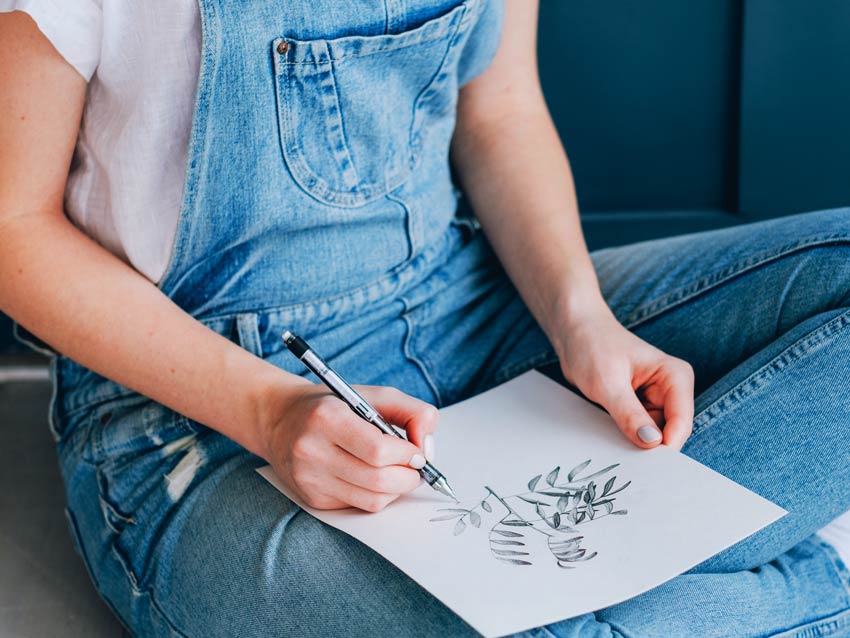Many artists and creative people believe that drugs and alcohol enhance their art or creative production. This is a myth. In reality, substance abuse chokes creativity and weakens the mind and body. It physically degrades every ability a person has, both natural and acquired.
Creativity Benefits the Recovery Process
As the body and mind heal from addiction, energy and creativity return. In fact, addiction recovery can be a rich time of discovering or reconnecting with one’s creative nature. Engaging in creative projects or outlets during recovery has both practical and spiritual benefits, from fending off boredom to processing complicated or intense emotions. Increasingly, addiction treatment encourages creativity to help those in recovery manage emotions in healthy ways.
So, what do addiction and creativity have in common?
Essentially, we are all capable of engaging in both addictive and creative behaviors. Addiction is a biopsychosocial illness resulting from the combination of an individual’s genetics and neurological makeup. Additionally, psychological and social factors influence an individual’s substance use. The same is true of creativity.
Creativity is also a genetic, psychological, and social phenomenon. Just as with addiction, a person’s personality, traumas, natural gifts, and interests influence and feed creativity.
How can creativity help those in recovery?
Many individuals suffering from substance use disorder have alexithymia, a condition that makes it difficult for them to identify or understand their own and others’ emotions. In fact, people often become addicted to substances or behaviors as a way to avoid dealing with their emotions. A crucial aspect of recovery is learning how to process emotions, and engaging in creative outlets can help those in recovery acknowledge and talk about their feelings.
How does creativity help with emotional regulation?
Creative production offers a person an outlet to express emotion nonverbally. Creative approaches have the potential to act as a stepping stone from mental and emotional blockage to psycho-emotional liberation. In the absence of words, we have the option to communicate through music, drawing, painting, acting and creative writing.
Further, creative activities offer numerous benefits for those in recovery, such as:
- A guided recognition of negative emotions. Creative experiences allow people to face the guilt or embarrassment they may feel about their addiction without becoming emotionally overwhelmed or pushed toward relapse. For example, one study shows that listening to music, engaging in creative writing and journaling, and role-playing reduce stress and lessen the presence of negative thoughts and emotions, facilitating the acceptance of loss, pain, and failure.
- Vicarious therapy. Many in recovery struggle with intense experiences of past trauma. Via art, writing, and other creative outlets, people can explore and work through those memories from a safe, healthy distance.
- Increased professional performance. People who nurture their creativity with artistic activities manage and recover more quickly from job stress.
- A chance to return to a childlike state of being. Many people report increased levels of levity, humor, and playfulness after prolonged creative activity. Lightening our moods helps tremendously in maintaining sobriety.
- Experiencing a creative “high.” Often, people report entering a creative flow while expressing themselves artistically. This “flow state” is not too different from experiencing a substance-induced high, the only difference being that this type of high is 100% healthy for the mind and body. This flow may allow individuals to feel present and focus on their goals.
Perhaps most importantly, creativity helps us to learn how to accept our mistakes and failures and convert them into usable and powerful energy. Addiction attempts to destroy that energy, leaving its victims numb and inactive. Creative endeavors empower those in recovery and help ward against relapse.
We Are Ready to Help
If you or a loved one are suffering from a substance use disorder or feeling shaky in your recovery, St. Gregory Recovery Center can help. Our full continuum of care, including our Health and Wellness Program, greatly increases the possibility of vibrant success in sobriety for every resident. Don’t hesitate. Reach out today to embrace creative sobriety.











